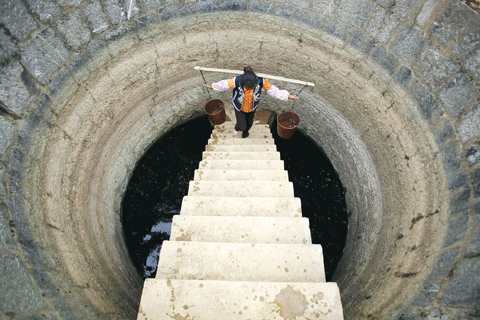Emergency wells were being drilled and cloud-seeding operations carried out in southern China, where the worst drought in decades has left millions of people without water and caused more than 1,000 schools to close, officials said yesterday.
Provincial and national land resources bureau officials met in Kunming, capital of the hardest-hit province, Yunnan, to discuss details of deploying workers to dig wells and increase cloud seeding and other aid to people in need of drinking water, said a director at the Yunnan Land Resources Bureau, surnamed Ma.
“The situation here will get worse in the coming months before it gets any better, but hopefully with more wells and water being diverted to those in need, we can help ease the situation,” said Ma, who like many Chinese officials would give only his surname.

PHOTO: REUTERS
The drought, which has left southwestern China suffering since last year, has affected about 61 million people and left about 5 million hectares barren in Guizhou, Yunnan, Sichuan, Chongqing and Guangxi, the official Xinhua news agency cited the Ministry of Civil Affairs as saying.
For parts of Yunnan, it is the worst drought in a century, with about 5.4 million people facing water shortages, Ma said.
Workers there are drilling daily in hopes of digging 1,035 wells by the middle of May, with 52 already functioning and 288 under way, providing 20 percent of the needed drinking water, he said.
“Cloud seeding hasn’t been very successful, so even though we are drilling for wells and diverting water from dams to people in need, new areas will begin to suffer as long as there is no rain,” Ma said.
No details were given on the cloud-seeding efforts. China has been experimenting with weather modification for decades, using a technique known as cloud-seeding to induce rainfall, though international scientists say there has never been proof that such methods produce results.
China’s huge land mass means drought can occur in one region while others have record-breaking temperatures and severe storms that can cause floods. A massive sandstorm earlier this week covered Beijing and other cities in northern China in a layer of sand and grit.
Since late last year, mountainous Yunnan and its neighboring provinces have received little rainfall, causing 23.7 billion yuan (US$3.47 billion) in crop and livestock losses worth, Xinhua said.
Neighboring Guizhou Province has been hit with its worst drought in 80 years, while in Guangxi it is the worst in 50 years, a report posted on the National Flood Control and Drought relief Web site said.
In Guangxi, 1,100 schools were closed in the towns of Hechi and Baise this week Xinhua said.
“We’ve sent out teams to dig and drill for wells this week in regions that have been hardest hit in the province,” said an official who answered the phone at the Guangxi Land Resources Bureau, who refused to give his name.
In Guangxi, where sugar cane crops have perished and white sugar production is expected to decline this year, 67 producers have been forced to shut down, nearly double the number during the same period last year, Xinhua reported.
Military personnel have also been deployed to the disaster areas to transport water from Zhejiang in the east to Guizhou and Yunnan, state broadcaster China Central Television (CCTV) said.
CCTV yesterday noon showed footage of soldiers unloading bottled drinking water from military trucks at a village in Yunnan.

Kehinde Sanni spends his days smoothing out dents and repainting scratched bumpers in a modest autobody shop in Lagos. He has never left Nigeria, yet he speaks glowingly of Burkina Faso military leader Ibrahim Traore. “Nigeria needs someone like Ibrahim Traore of Burkina Faso. He is doing well for his country,” Sanni said. His admiration is shaped by a steady stream of viral videos, memes and social media posts — many misleading or outright false — portraying Traore as a fearless reformer who defied Western powers and reclaimed his country’s dignity. The Burkinabe strongman swept into power following a coup in September 2022

TRUMP EFFECT: The win capped one of the most dramatic turnarounds in Canadian political history after the Conservatives had led the Liberals by more than 20 points Canadian Prime Minister Mark Carney yesterday pledged to win US President Donald Trump’s trade war after winning Canada’s election and leading his Liberal Party to another term in power. Following a campaign dominated by Trump’s tariffs and annexation threats, Carney promised to chart “a new path forward” in a world “fundamentally changed” by a US that is newly hostile to free trade. “We are over the shock of the American betrayal, but we should never forget the lessons,” said Carney, who led the central banks of Canada and the UK before entering politics earlier this year. “We will win this trade war and

‘FRAGMENTING’: British politics have for a long time been dominated by the Labor Party and the Tories, but polls suggest that Reform now poses a significant challenge Hard-right upstarts Reform UK snatched a parliamentary seat from British Prime Minister Keir Starmer’s Labor Party yesterday in local elections that dealt a blow to the UK’s two establishment parties. Reform, led by anti-immigrant firebrand Nigel Farage, won the by-election in Runcorn and Helsby in northwest England by just six votes, as it picked up gains in other localities, including one mayoralty. The group’s strong showing continues momentum it built up at last year’s general election and appears to confirm a trend that the UK is entering an era of multi-party politics. “For the movement, for the party it’s a very, very big

The Philippines yesterday slammed an “irresponsible” Chinese state media report claiming a disputed reef in the South China Sea was under Beijing’s control, saying the “status quo” was unchanged. Tiexian Reef (鐵線礁), also known as Sandy Cay Reef, lies near Thitu Island, or Pagasa, where the Philippines stations troops and maintains a coast guard monitoring base. Chinese state broadcaster CCTV on Saturday said that the China Coast Guard had “implemented maritime control” over Tiexian Reef in the middle of this month. The Philippines and China have been engaged in months of confrontations over the South China Sea, which Beijing claims nearly in its